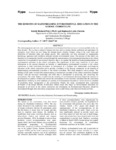| dc.description.abstract | The mismanagement and even over- exploitation of environment has been an area of concern globally in the last
three decades. This is closely related to human activities such as mining, human settlement and agriculture. In
retrospect, these effects are now being felt through drastic climatic changes, rising of the water basin and
distinction of important plant and animal species. This catastrophy has been associated to inappropriate
knowledge, ignorance and retributive attitudes towards environmental issues. The purpose of this study was
therefore to investigate the benefits accrued through the mainstreaming of environmental education in the school
curriculum. It was guided by one research objective, that is, to examine the benefits of mainstreaming themes of
environmental education in the school curriculum. The significance of this study would be: to add more
information to the present literature on benefits of mainstreaming environmental education in the school
curriculum, to help curriculum developers in formulation of a syllabus that mainstreams environmental
education in the school curriculum and to provide a feedback to the Kenyan community on the benefits of
mainstreaming environmental education in the school curriculum. This study adopted a survey design. The
findings of the study revealed that mainstreaming environmental education in the school curriculum equipped
learners with the necessary knowledge and skills that is instrumental in preserving and conserving the
environment. The study further revealed that the teaching of environmental education helped the learners to
develop positive patterns of behaviour toward the environment. It was therefore concluded that the curriculum
implementers should give more emphasis on teaching of environmental education at various levels as a method
of promoting better management of the environment. Finally this study, recommends that: curriculum
developers at the Kenya Institute of Education should ensure that topics on Environmental Education are
integrated at all levels in the school curriculum and information on Environmental Education should be
disseminated through other educational programmes such as adult literacy and other non-formal activities. | en_US |

